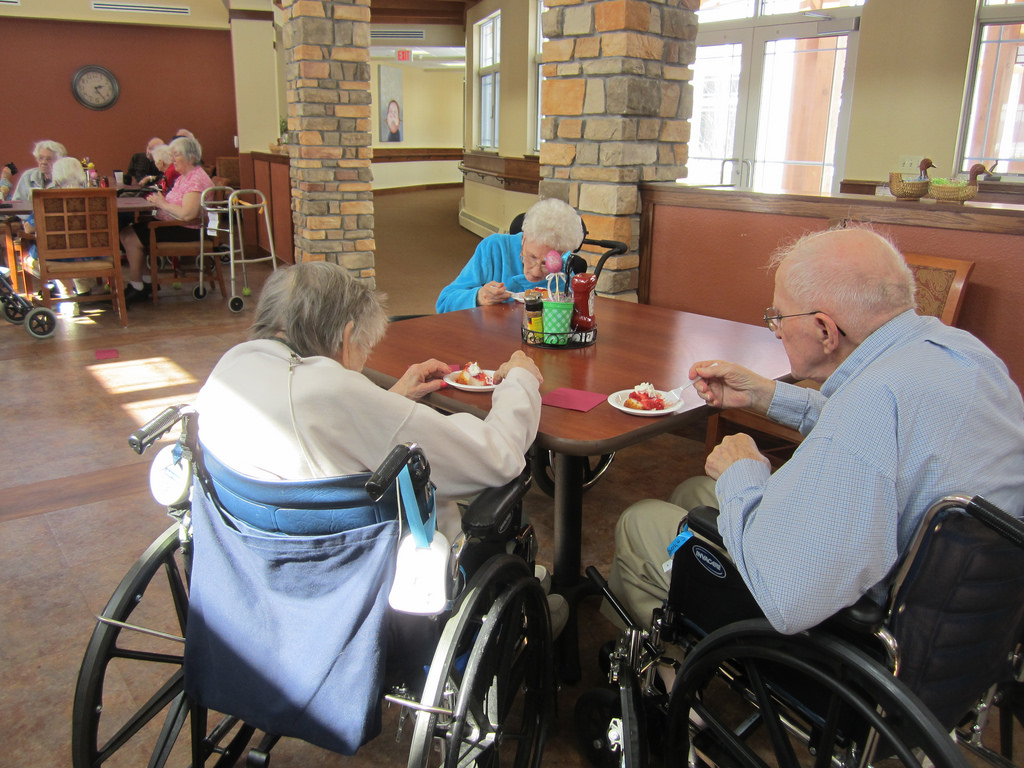
Photo credit: Ann, via Flickr
Residents were wearing old and oversized clothes. Some had no shoes or only one on. One resident had personal belongings overflowing from her dresser onto the floor. Paint buckets, janitor wastebaskets and medicine carts cluttered the hallways. Residents had little space to roam. They were packed tightly around small dining tables and in a dreary recreation room with nothing in front of them except dingy yellow walls.
South Elgin Rehab and Health Care Center, a 90-bed facility, is one of 34 one-star nursing homes in the Chicagoland area, according to the federal government’s five-star rating system. Five-star nursing homes are the best, and one-star nursing homes are the worst. At the beginning of October, the state changed South Elgin Rehab’s one-star rating to two-stars. However, a visit on Oct. 13 showed the facility was still in disrepair.
—
Over the past six years, a red bumpy rash has plagued residents at South Elgin Rehab multiple times caused by mites burrowing in residents’ skin and digging tunnels to lay their eggs. Other immobile residents who have sat for hours without being moved developed painful bedsores. One resident’s bedsore was left untreated for so long it became infected. When the pus was drained, it revealed part of the resident’s lower backbone.
Residents have refused to eat what was given to them and have been left to starve. One resident had to be rushed to the hospital for dehydration and malnutrition. Instead of hiring more staff to monitor them, residents have been restrained to their wheelchairs to prevent them from falling. When residents were not restrained, they sustained untreated fractures.
The nursing home was fined twice out of all these violations. The two fines combined total less than $30,000.
Since the nursing home’s opening, it has had four different administrators. The current administrator, Susan Held, replaced the former administrator, Elizabeth Gilbert, at the beginning of 2014. Gilbert left her position to take a promotion as a regional clinical director. Held started working at South Elgin Rehab as a dietitian supervisor before she became an administrator. She had no prior administration experience.
Under Held’s administration, the facility continues to have problems with hygiene and sanitation, not properly treating patients with pressure sores, not preventing patients from continually losing weight and not supervising high-risk residents. According to the available online surveys from the Illinois Department of Public Health dating back to Jan. 2010, no residents had died because of inadequate care. On June 1, a resident who had cognitive impairment and needed supervision while eating was the first casualty.
The online surveys represent only a small number of the violations committed at South Elgin Rehab. Any violations that had not been reported are not available online. While some violations that have been reported are listed online, the violation reports are not available.
In March, Held hired a new “seasoned” director of nursing, Remedios Monalac. She said Monalac has been vital to improving the facility’s care.
“The nursing home is 90 percent nursing so if you don’t have a leader, a good leader in charge, it crumbles and falls,” Held. “[Monalac] is extraordinary. She is going to glue it back together.”
Held also hired a new wound doctor who visits once a month to ensure bedsores are being properly treated. To her knowledge, none of her current resident have acquired bedsores at her facility.
Held said her facility is much better than a one-star or two-star nursing home. By the end of this month or next, she believes her nursing home will be a three-star facility and a four-star facility by the end of the year.
“If you had been here three years ago, the management staff I believe is a lot better than it was,” Held said. “My motto is make a place better than when you got there, so I think I am still making a difference.”

In June, the resident who was known to eat too quickly and had cognitive impairment choked on her sandwich, according to an IDPH inspection report. A nurse rushed to her side and attempted the Heimlich maneuver. When the resident became unresponsive, the nurse placed her on the floor, called for help and started performing CPR. Hours later at the hospital, she died, the report said.
Two CNAs were supposed to be present in the dining halls on the evening the resident died. One CNA was supposed to pass out food while the other CNA supervised residents eating. According to the report, one CNA left to help another staff member while the second CNA passed out snacks. The second CNA then left to continue passing out snacks in the second and third dining halls. While the first dining hall was left unsupervised, the resident choked on her sandwich.
The facility was only fined $25,000 for the resident’s death.
Held said in an interview, her staff did everything they could and insisted they were not at fault for the resident’s death. She said it would not have matter if she had more staff members to supervise patients.
“Anyone can choke anywhere,” Held said. “Unfortunately, things like that just happen.”
Held was not present at the time of incident, since the event occurred during the evening hours.
The owner of South Elgin Rehab, Mark Petersen, did not visit the facility. In fact, Petersen has not visited South Elgin Rehab since before Held joined the facility as a dietitian supervisor, Held said. Held has never met Petersen.
South Elgin Rehab is one of 70 nursing homes in Illinois owned by Petersen. Of the 70 nursing homes he owns, 25 of them are one-star nursing homes, 16 are two-star nursing homes, 14 are three-stars, seven are four-stars and six are five-stars. He also owns seven hotels in the area including a Country Inn & Suites, a Hampton Inn & Suites and a Hotel Inn Express.
Petersen could not be reached for comment at the time of publication.
Four months after the resident died from choking, the nursing home went from being a one-star facility to a two-star.
A bad nursing home can improve its rating quickly, said Wendy Meltzer, executive director of Illinois Citizens for Better Care, a leading advocacy group for nursing home residents. One way a nursing home can immediately boost its rating, regardless of the violations it has committed, is by hiring more staff.
Meltzer explained, nursing assistants only have to an eighth grade education or the equivalent and be 16 years old to work in a nursing home.
“Compare that to how much training you have to have to be a nail technician in Illinois, or cut someone’s hair,” Meltzer said.
Since the resident’s death, Held said she has not changed her hiring criteria for certified nursing assistants, which is the same as the state of Illinois.
According to information provided by The Centers for Medicare & Medicaid Services, South Elgin Rehab has a four-star staff rating and a one-star health inspection rating.
The health inspection rating is based on an average of all surveys conducted by the Illinois Department of Public Health over three years, said Meltzer. The department conducts surveys every time a nursing home commits or is accused of committing a violation, or is up for license renewal. Three years after the grievous offense, the nursing home’s rating will improve because the offense is no longer being calculated into the nursing home’s health inspection rating.
The nursing home goes from really bad to bad, said Meltzer.
When South Elgin Rehab was cited for numerous violations, according to its survey responses filed with the state’s department of public health, staff would be receive additional training to resolve the problem. Held said, the re-training she provides her nurses is ongoing and each training lasts less than an hour. Sometimes an outside trainer is brought in, she said. Most of the time, the staff receives additional training from Monalac, the site’s director of nursing.
“The [training] is a piece of paper, you sign up, you role play or whatever it is, and then you get to sign the paper saying you know what you are doing,” Held said.
In March 2015, another report was filed regarding a resident diagnosed with Parkinson’s disease, psychosis and dementia who was not carefully monitored to prevent further weight loss. As a result, the resident was hospitalized for dehydration and malnutrition. Upon hospitalization, the resident’s family was not notified. The facility was fined $2,200.
“Unfortunately, in a nursing home you can’t make people drink,” Held said.
Leading up to the resident’s hospitalization, she was only drinking and eating half the amount she needed. In the six months prior to her hospitalization, the resident lost 13 lbs. She went from weighing 106 lbs. to 93 lbs.
A registered dietitian recommended the resident be put on a diet of super cereal and whole milk, but the recommendation was not carried out. When the resident was still losing weight the following month, the dietitian recommended the resident be given a dietary supplement three times a day. The recommendation was not carried out.
The nursing home’s dietitian manager said she never received the registered dietitian’s recommendation.
“Maybe it just s[l]ipped my mind. I have so much work to do and forgot about it. Now I won’t,” she said.
![Christmas Day at a nursing home. Photo courtesy: Stephen Craven [CC BY-SA 2.0 (http://creativecommons.org/licenses/by-sa/2.0)], via Wikimedia Commons](http://www.chicagotalks.org/wp-content/uploads/2016/12/Christmas_Day_in_a_nursing_home_-_geograph.org_.uk_-_1091150-400x300.jpg)
The resident’s care plan was never revised to reflect the dietitian’s recommendations. The dietitian said it was the dietary manager’s responsibility; the dietary manager said it was the dietitian’s responsibility.
The resident’s family had not been notified by the nursing home of her hospitalization until they called the facility and found out she was no longer there. The registered nurse who had been monitoring the resident before her hospitalization had noted in hospital records that the family had been notified. The nurse said she did not know why she documented the family had been notified.
“It was one of those days when a lot was going on,” the nurse said.
To Held’s knowledge, the resident did not die. She said obesity was more of a problem at her facility than chronic weight loss.
In May of that same year, the state’s department of public health filed a 47-page report regarding violations at South Elgin Rehab. The report is the longest one filed online in the department’s nursing home database. The report included the following: The rooms of 34 residents were poorly kept. A shower head was missing from the women’s bathroom on the 300 wing. Multiple rooms had exposed electrical wiring. The men’s bathroom had leaking pipes. Three rooms did not have working call lights. Two rooms were missing privacy curtains.
Five completely dependent residents were not properly cared for. One resident had overgrown toenails. Another resident could not find a nurse to help her go to the bathroom and she wet herself. Another resident was wearing old clothes, wet pants and had long, jagged toe nails.
One resident was only wearing a dirty shirt and an adult diaper. Her legs were completely exposed with no blanket covering them. The woman’s daughter said the nurses told her it was easier for them to change her mother’s depends if her mother didn’t wear any pants.
Another resident was only wearing a hospital gown and hadn’t been bathed. A nurse said she wasn’t going to be showered because a nurse called off and the facility was short staffed.
In July, according to the most recent inspection report available, a resident who had a high risk for developing pressure sores was not being treated properly. The resident had a history of developing ulcers on his buttock, his left heel and ankle, and his right foot. A physician ordered for the resident to wear bilateral heel protector boots at all times to prevent pressure sores from developing. The resident was also supposed to be given a low-air-loss mattress.
On July 25, the resident was not wearing his boots at lunch. A CNA told him to put on his boots and he said he had not worn them the previous two days. On July 26 and 27, the resident’s pressure mattress was not turned on or plugged in. The resident had not been out of bed since July 25. The resident needed extensive assistance from two or more staff members for bed mobility and transfers.
When a CNA checked the resident for pressure sores, the resident’s lower back was red. The CNA said the resident used to have a pressure sore there and no longer did. Twenty-five minutes later a different employee reported the resident had a pressure sore on his lower back.
Before Held hired her new wound doctor, her facility went three months without one in 2014. During this time, a resident developed a pressure sore so deep it touched his lower backbone.
“I just want things to be better,” Meltzer said. “I have spent 30 years doing this and things haven’t changed.”












Be First to Comment